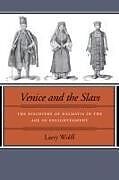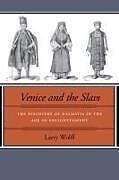Venice and the Slavs
Einband:
Fester Einband
EAN:
9780804739450
Untertitel:
The Discovery of Dalmatia in the Age of Enlightenment
Genre:
Geschichte
Autor:
Larry Wolff
Herausgeber:
Stanford University Press
Auflage:
New.
Anzahl Seiten:
424
Erscheinungsdatum:
01.04.2002
ISBN:
978-0-8047-3945-0
Autorentext
Larry Wolff is Professor of History at Boston College. His most recent book is Inventing Eastern Europe: The Map of Civilization on the Mind of the Enlightenment (Stanford, 1994).
Klappentext
"This is a fascinating, brilliant, compelling study of how many Europeans came to conceptualize the little-known 'barbarians' on the eastern fringes of Europe in the Enlightenment. . . . This new book goes still further in demonstrating how complex the whole question of recognizing difference and establishing what the definitions of civility were."--Anthony Pagden, Johns Hopkins University
"A fine imaginative historian who makes a persuasive case for the origin of the concept "eastern Europe," [Wolff] has a tendency to base his assertions not only on the findings of his meticulous research but on theories he discovered in the work of the late Michel Foucault, who sought to disclose how knowledge, in the guise of various scientific "discourses," exercised a disciplinary power."--Slavic Review
Zusammenfassung
This book studies the nature of Venetian rule over the Slavs of Dalmatia during the eighteenth century, focusing on the cultural elaboration of an ideology of empire that was based on a civilizing mission toward the Slavs. The book argues that the Enlightenment within the Adriatic Empire of Venice was deeply concerned with exploring the economic and social dimensions of backwardness in Dalmatia, in accordance with the evolving distinction between Western Europe and Eastern Europe across the continent. It further argues that the primitivism attributed to Dalmatians by the Venetian Enlightenment was fundamental to the European intellectual discovery of the Slavs. The book begins by discussing Venetian literary perspectives on Dalmatia, notably the drama of Carlo Goldoni and the memoirs of Carlo Gozzi. It then studies the work that brought the subject of Dalmatia to the attention of the European Enlightenment: the travel account of the Paduan philosopher Alberto Fortis, which was translated from Italian into English, French, and German. The next two chapters focus on the Dalmatian inland mountain people called the Morlacchi, famous as savages throughout Europe in the eighteenth century. The Morlacchi are considered first as a concern of Venetian administration and then in relation to the problem of the noble savage, anthropologically studied and poetically celebrated. The book then describes the meeting of these administrative and philosophical discourses concerning Dalmatia during the final decades of the Venetian Republic. It concludes by assessing the legacy of the Venetian Enlightenment for later perspectives on Dalmatia and the South Slavs from Napoleonic Illyria to twentieth-century Yugoslavia.
Inhalt
Introduction; 1. The drama of the Adriatic empire: Dalmatian loyalty and the Venetian lion; 2. The useful or curious products of Dalmatia: from natural history to national economy; 3. The character and customs of the Morlacchi: from provincial administration to enlightened anthropology; 4. The Morlacchi and the discovery of the Slavs: from national classification to sentimental imagination; 5. Public debate after Fortis: Dalmatian dissent and Venetian controversy; 6. The end of the Adriatic empire: epidemic, economic, and discursive crises; Conclusion and continuities: the legacy of the Venetian enlightenment in Napoleonic Illyria; Habsburg Dalmatia, and Yugoslavia.

Leider konnten wir für diesen Artikel keine Preise ermitteln ...
billigbuch.ch sucht jetzt für Sie die besten Angebote ...
Die aktuellen Verkaufspreise von 6 Onlineshops werden in Realtime abgefragt.
Sie können das gewünschte Produkt anschliessend direkt beim Anbieter Ihrer Wahl bestellen.
Loading...
Die aktuellen Verkaufspreise von 6 Onlineshops werden in Realtime abgefragt.
Sie können das gewünschte Produkt anschliessend direkt beim Anbieter Ihrer Wahl bestellen.
| # | Onlineshop | Preis CHF | Versand CHF | Total CHF | ||
|---|---|---|---|---|---|---|
| 1 | Seller | 0.00 | 0.00 | 0.00 |
